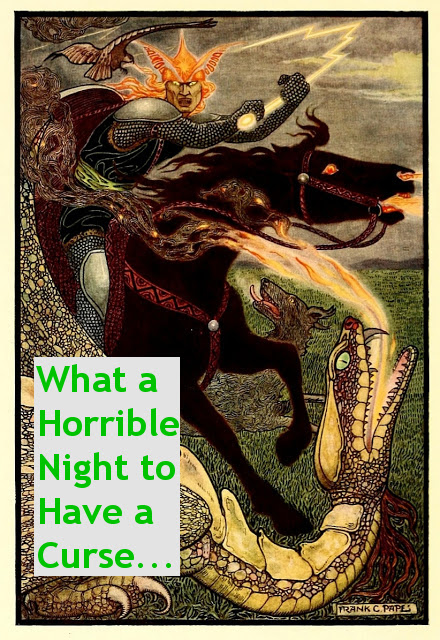We have a short section, about a page, giving us a bit more detail about alignments in the game, and how they relate to group adventures (since this a sub-heading of the "Playing in a Group" section of the book).
We first up get a reminder of what alignment means, that there are three in the game, and that each has a secret language which includes body language as well as spoken words. Your alignment is YOUR business as a player - there is no reason to tell other players what your character's alignment is, but the DM must know. This is because the DM is supposed to police alignment related play, and either suggest a change or offer up some punishment to get the player to actually play their alignment right.
I've never been a fan of alignment punishments, unless it's somehow an important part of the class (like the Paladin/Avenger and Druid high level options in BECMI, or some AD&D classes). Even then, I'm more likely to suggest different avenues of play if a player suggests doing something I feel is against their alignment, but allowing them to do it anyway if they insist (and believe it isn't contradictory). In other words, I don't like alignment as a straight-jacket. It's more like guidelines. Yes, like the Pirate's Code in the PotC movies. I have occasionally suggested an alignment switch (without penalty) if a player was playing their PC in a way that seemed contradictory to their written alignment.
Anyway, back to the book.
Law - people who believe in law & order, the benefit to the greatest number, keeping your word, etc. They believe that the universe follows an Order. I do like the note that it doesn't necessarily mean always following the law (as in political laws) if that law seems unjust.
Chaos - people who believe in selfish interests and what you can get away with, chance and luck, and the individual over society. They believe that the universe is random. As such, they act on impulse or on whims, and usually can't be trusted.
Neutrality - people who see life as somewhere between Law and Chaos, where too much of one or the other is not good. They believe that the universe is Balanced. It then notes that personal survival is of utmost importance to them, which I have always found a bit hard to square away with Frank's definition of Chaotic behavior. I've come to believe that it means (as described later) that when the chips are down, they are more likely to act Chaotically than Lawfully.
My character in Vaults of Ur, Thidrek the Sleestak, is actually a pretty good poster child for this sort of Neutral behavior. He tends to support the group, but if things get too dangerous, he's not afraid to save his own skin, even if that means abandoning companions. As he's gotten higher in level, he finds himself less at risk, so tends to act more heroically. But he still keeps a few potions stored away that could help him escape danger if he has to.
Anyway, I think a re-write to make greed the ultimate drive for Neutrals would fit the treasure scavenging/monster battling/exploring the unknown nature of the game better. Lawfuls are in it to benefit everyone in the group. Chaotics are in it to benefit themselves. Neutrals are in it to get rich. Just a thought.
And again, back to the book.
Next, Frank gives us an example of how characters of each alignment might react to an overwhelming combat encounter. Lawful characters will protect the group, possibly sacrificing themselves so that the others can escape. Neutrals will risk their lives up to a point, but if they find themselves in serious danger will abandon the group. Chaotics will do as they please, and the party be damned.
Finally, we get some information on alignment languages. Every creature able to speak has an alignment, and knows their alignment language. They are never written down. If a character changes alignment, they automatically know the new one and forget the old one. Realism can take a flying leap on this one.
I go through phases with regards to alignment tongues. In some sense, I like them, having some way to communicate with monsters without having to have a party of linguists. On the other hand, they are inherently unrealistic, and can cause players to lose suspension of disbelief.
Anyway, I think the gem of this section is the final note from Frank. Acting your alignment does NOT mean you need to make stupid choices. Your intelligence determines that. In other words, have fun and use your alignment as a tool to enhance your character's personality, rather than as stipulations or restrictions on how you play. Or at least that's how I interpret that passage.
DaveCon!
3 hours ago






No comments:
Post a Comment